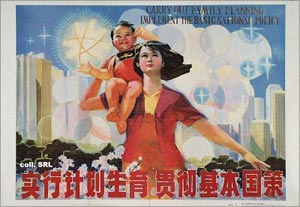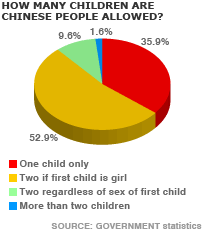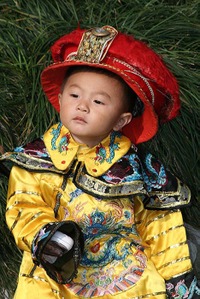Chinese Love – Part Seven Posted by sasha on Dec 9, 2011 in Culture, Uncategorized
Now that the wedding and the honeymoon (蜜月 – mì yuè) are over, what’s family life like in China? Well, ever since 1976, Chinese families have lived with the One Child Policy (计划生育政策 – jì huà shēng yù zhèng cè). It is a common misconception, however, that all Chinese are limited to only one child. In fact, there are many loopholes to this rule, and it doesn’t directly affect everyone. For example, the law is directed mainly at Han (汉 – hàn) Chinese, and does not equally affect the countless ethnic minorities (少数民族 – shǎo shù mín zú) living in China. Even Han Chinese are usually permitted to have more than one child if they live in rural areas. Also, if both parents are themselves only children, they’re often allowed to have two kids. Actually, in 2007, the National Population and Family Planning Commission estimated that the policy applies to only about 36% of China’s population. For city slicker families who don’t qualify for any of the loopholes, they can always pay the hefty second child fine.
There is a nickname for this generation of city-dwelling only children – little emperors (小皇帝 – xiǎo huáng dì). These children are the center of their families, and they are often spoiled rotten. Receiving all of the attention not only from mom and dad, but also from grandparents and other family members, these little emperors often get whatever they want, whenever they want. Also, with the economic developments of the past few decades and the fact that both parents work in most families these days, there’s more disposable income and less children to blow it on. This means more toys, more clothes, more books, and yes, more food, for these kids. Here is an informative article about the generation of little emperors in China.
CNN piece about the growing influence, and spending power, of the little emperors.
While these only children may get pampered quite a bit, they’re also pushed very hard to succeed, as competition for universities and good jobs will only get more and more difficult in China. It’s not uncommon for a six-year old to spend all day in school, then go to piano lessons, then swimming lessons, and then have a private English tutor. These children are pushed hard by their parents to be successful. In China, everybody wants their son to be a dragon (龙 – lóng), or their daughter to be a phoenix (凤凰 – fèng huáng).
In modern day China, it’s not just the children that need to be taken care of, however. These days, it’s not uncommon for a married couple to take care of both sets of grandparents, in addition to their little emperor. This is known as the “4:2:1” problem – 4 grandparents, 2 parents, and 1 child. Here is a great article that gets into the nitty gritty details of the one-child policy and its effects.
Well, at least the institution of marriage and the family unit are holding strong in China, aren’t they? Although an ancient Chinese proverb translates as “You are married until your hair turns white,” that isn’t quite the case these days. In fact, the divorce rate in China has been skyrocketing in the past few years. It is said that some 5,000 couples get divorced (离婚 – lí hūn) in China… every day. That’s not a typo. Every day. A recent law regarding divorce in China has been dubbed “the law that makes men laugh and women cry“, as it states that whoever paid for property is the legal owner, with full rights to it in case of divorce. The law, which is an attempt to make divorce less attractive and restore some lost values, has Chinese women quite perturbed, and rightfully so.
http://www.youtube.com/watch?v=O0bDlsjqC2c
Australian news short about the new divorce law in China.
It’s a shame so many marriages are ending in China these days, especially considering all the work that went into those weddings…

Build vocabulary, practice pronunciation, and more with Transparent Language Online. Available anytime, anywhere, on any device.
About the Author: sasha
Sasha is an English teacher, writer, photographer, and videographer from the great state of Michigan. Upon graduating from Michigan State University, he moved to China and spent 5+ years living, working, studying, and traveling there. He also studied Indonesian Language & Culture in Bali for a year. He and his wife run the travel blog Grateful Gypsies, and they're currently trying the digital nomad lifestyle across Latin America.







Leave a comment: